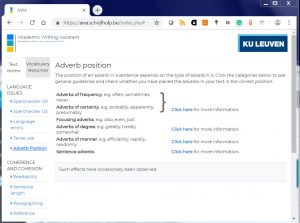Language! What’s in a word? What’s in a language? Well, almost everything! It can be embarrassing to make writing mistakes, but it happens to all of us.
If you send an email, and later realize that it contains an error, you may end up looking unprofessional. But other communication mistakes can have more serious consequences. For example those in scientific texts. They can blemish your paper, or your manuscript will not be accepted for publication because of poor English. Get your language use right! Good news, we have something to offer that is more advanced than an average spellchecker.
What do you think, which sentence is correct?
- This simple statistical problem occurs often in geological applications.
- This simple statistical problem often occurs in geological applications.
The word ‘often’ is an adverb of frequency like ‘sometimes’ and ‘never’. Adverbs of frequency are generally placed before the main verb (‘occurs’), so the second sentence is correct.
Which sentence is more accurate?
- Since April 2018 they worked on the project in close collaboration.
- Since April 2018 they have been working on the project in close collaboration.
In the first sentence the past tense is used (‘worked’). The past tense is used to refer to something that happened at a specific moment in the (distant or recent) past. In the second sentence the present perfect is used (‘have been working’). The present perfect is used to refer to events or activities that took place in the past but are still connected with the present. The word ‘since’ in the sentence is an indication of ‘time up to now’ suggesting that the collaboration has not yet been finished. So, if this is what you are trying to say, the second sentence is correct.
And what about these sentences?
- Such effects have been observed occasionally.
- Such effects have occasionally been observed.
The adverb of frequency ‘occasionally’ is generally placed after the first auxiliary verb in a complex verb form (‘have been observed’). So again, the second sentence is correct.
If you struggle (like I do) with past tense versus present tense and with the position of the adverb in a sentence – and many other language issues – you should use the Academic Writing Assistant to help you out. The Academic Writing Assistant (AWA) has been developed by a team of language specialists from KU Leuven, and has recently been purchased by TU Delft Library (department of Research Support).
The writing assistant gives you tips and comments regarding the structure, style and spelling of your scientific and less-scientific texts.
If you are a TU Delft researcher or a student you can request a free login code for the tool. Find more information about the Academic Writing Assistant on the TU Delft Library website.
Any questions? Send an email to library@tudelft.nl attn. Research Support.

